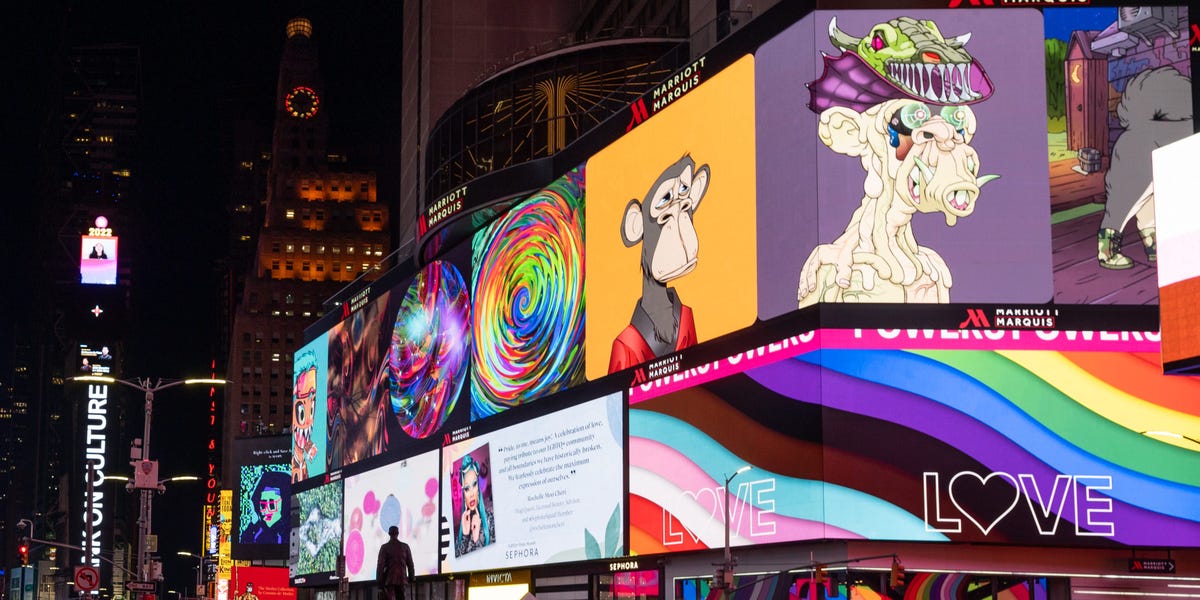Remember when NFTs sold for millions of dollars? 95% of the digital collectibles are now probably worthless.::NFTs had a huge bull run two years ago, with billions of dollars per month in trading volume, but now most have crashed to zero, a study found.
Not my Donald Trump trading cards! Nooo!
Weren’t those not even nfts? I believe I remember reading that they were basically just jpegs or something to that effect. Makes sense though, better return of investment on that scam.
Still waiting for that Seth Rogen TV show…
CryptoPunks still going strong though.
What’s with the downvotes? They are trading for ~$80k a piece currently and have been around since 2017. I’m not saying it’s a solid investment, far from it actually. But I don’t believe they will be “worthless” any time soon.
Cause they don’t add any value to the world. They are like parasites.
*Are
At what point do they turn the servers off?
Remember? Fuck no.
It was what for like 5 minutes during a year with a million other more important things going on to pay attention to that thing that kids with only somewhat rich parents used to try and scam their way to being as rich as the kids with really rich parents.
It was just another form of money laundering though ‘art’.
That’s exactly what it was. If I wanted to wash money, the easiest way to do it would be to create some bullshit digital pic and then buy it myself from an alt dummy account.
Started laughing when nfts were introduced, still chuckle today.
It’s great. Love it.
Grab the tulips! Grab them!
Most of them have been worthless all the time but people like gambling.
There are only very few that hold real world value.
They started out worthless. That never changed.
Now? Probably?
Oh no.
Anyway.
I’m sure they were a great way to launder money at the time.
That’s why it’s at the time. I made a quick $600 and never looked back cuz I knew it was unstable, but I wasn’t ignorant to the idea like many people who just wanted to bandwagon hate.
Ignorant to the idea? The idea was basically a spreadsheet with links to PNGs and “”““owner””“” of that PNG. Blockchain only means nobody owns the sheet itself, but that doesn’t make it any less ridiculous.
Mostly used for money laundering
I’d say there’s a fair number of people just speculating.
And a couple people get lucky and make it big. And that’s promoted. Cuz it looks great.
But like a lot of the big movements, are money laundering as you said, or a way to bribe people. This politicians wife’s cousins son sold an NFT for 4 million that’s amazing!
But we get this with traditional art too. Any market where there isn’t commodity pricing, price discovery is flexible, so it can be used for lots of social reasons
Isn’t most art for money laundering. You move money and purchase a piece or “art” for 4 million. Art isn’t worth it. But because it’s been bought it now has a value. If you sell it. Now you’ve created money from nothing. Fucked up
Fine art and race horses, ad platforms, and let’s not forget high-end gambling and sports gambling.
Sheldon Adelson made billions laundering money for Chinese oligarchs through the Sands Singapore.
There’s so much dirty money floating from place to place with these obvious financial VPNs.
Not wrong
Isn’t most art for money laundering.
Certainly not. Millions of people create art every day for various reasons and various success. Heck, artists are generally known to be on the poorer end of society exactly because they often care for the art even if it doesn’t sell well. That is the case even for some of the now most famous artists in history. Quite a few of them died dirt poor while their pieces now sell for millions.
Is some art in certain circles used for money laundering? Most likely, but that’s definitely not “most” but at best mabye a few thousand pieces which are dwarfed by the billions of art pieces around today.
Art dealers then. The art that sells for millions. Who values these. One person buys it for something. So it creates that price tag. Now you can sell it for that valuation
I don’t think your examples complete.
You buy art from some no name but dead artist. You buy all the art. Then you take your dirty money which you can’t put on the open market, and give it to somebody who then uses clean money to buy your artwork on the public market. For a fee of course.
So now you have an argument that this artist is appreciating after their death, you’ve sold a bunch of artwork for a large profit, minus taxes, minus the cleaning fee from the buyer.
That would complete the money laundering cycle.
But that’s annoying, cuz you’re basically using somebody else to clean the money for you, it’s just the transfer back to you that the art facilitates.
I think bribes are where art really shines. Bribes are different than money laundering, because the money is ostensibly clean anyway, it’s just giving it to you for a reason that’s difficult. So the art is the excuse that enables the bribery
Probably?
It’s a free market. Anyone can come up and say that they are willing to pay millions for an
indifferent_insect_boat_club.jpegat any moment.






